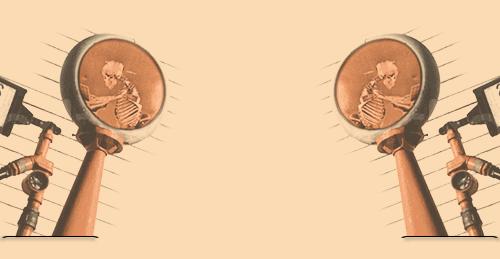The Sensible Dictator
Chris Keulemans is a cultural worker in Amsterdam, a Flying Café Europa crew member, an IWP alumnus, and the chief navigator, most recently, of http://www.theamericanineverwas.net/amerikaan/flex
The dark bronze statue of Saddam Hussein points in the direction of Jerusalem. Like every sensible dictator he shows his people that the greatest threat lies in the outside world. The square that this statue guards has been designed by a park architect with some ambition. A half circle of pillars surrounds Saddam. Two rectangular ponds mirror the harsh afternoon light. The hedges stand grey under a permanent layer of dust. This is Paradise Square. A sensible dictator gives beautiful names to ugly things. This makes his people insecure about their own judgement. And whoever proceeds to say that things aren’t so beautiful at all contradicts him, and he is allowed to imprison contradictors.
A few men are beating the foot of the statue with hammers. It doesn’t help much. A sensible dictator takes care to distribute solid pedestal and dinghy tools throughout the country. This will make even the reckless few quit their attempts before even reaching the dictator’s toes.
The park architect has created the path leading to the statue in the exact width of an Abrams-tank. The coalition forces come and take over from the guys with their little hammers. They park the tank so that they can climb the statue together. It looks a bit clumsy. A sensible dictator will see to it that his countrymen, when the war is lost after all, can do nothing without the foreigners and vice versa, which makes liberators start to look like invaders and average civilians like primitive locals. In this way, both feel they are collaborating with someone they cannot trust.
Laying a noose around his neck is not without difficulties. A sensible dictator will not be strangled just like that. The more time and energy it takes them, the more the liberators and the rebels start to look like henchmen themselves. This has an uneasy effect on the audience that is watching all over the world, and that has become familiar with Paradise Square over the past weeks. This is the location of Hotel Palestine, where the remaining tv-crews shot their images of smoke plumes hanging over distant parts of the city. A sensible dictator provides the media with the attractive disarmament of a statue at their front door, so that the last killings his men are executing far from the city squares stay out of sight.
Enough time goes by for a small crowd to gather. The presence of an audience promotes the destroyers into performers. And they act accordingly. Every gesture now takes on a symbolic air. A coalition soldier climbs up with an American flag, that he drapes over the moustached head of the statue. The sensible dictator is almost sorry that the soldier takes this blindfold down again shortly after, probably obeying orders from an officer who wants to prevent a pr-disaster. But it has already taken place.
Just as illustrative is the Iraqi flag that Saddam now gets strung under his chin like a necktie. The patriotic love for their country that the sensible dictator has installed in his countrymen is of the kind that hangs itself in the highest spot and then tears itself down. This suicide is prevented in time. But it too has already been committed.
In the breathless tension of the last minutes before the pulling down, minutes that seem to have no end, the panic of the people in Paradise Square is tangible. They want this so badly, and they are so afraid that it will fail after all. When the dictator finally does succumb, he is sensible enough not to dive completely from the foot of his statue. The roar from the crowd changes into something between despair, frustration and heart failure. A few men release their fury immediately, but the sensible dictator has made sure that his most avid opponent has no heavier projectile than an empty cardboard box. This turns the most deeply supressed gesture of a man’s life into its most powerless one. Even after his fall the dictator humiliates his subservients.
And he keeps doing so even when being trampled underneath their feet. Delirious men they are, who rip their shirts up just to have something to wave. They look like the last men you would entrust the future of a civilized nation to. The binding principle of their existence lies shattered on the ground, the breakdown in their minds might be beyond repair. There is, by the way, not a woman in sight.
A sensible dictator takes care that his statues might be intimidatingly large, but not overly expensive. The bars sticking from his shoes prove that the bronze was hollow. And the dictator will always drag as many as possible down with him. He has handed over the barbary expertly. It is sitting on his head now, in the figure of just a boy from Baghdad, and allows itself to be towed by his friends along the dusty boulevard. It is plundering the last distribution centres for rice and flower, that now remain unguarded. It hoists other people’s refrigerators into the street. It hits an unearthed fedayeen in his face with a wooden bat, somewhere in another square with a beautiful name. It destroys the last things that were still intact in this society where for so long nothing ever belonged to him, and the toppled dictator even when beaten to pieces and spit upon by passers-by keeps smiling his condescending smile at them, because he knows that he couldn’t have handled things any more sensibly.



